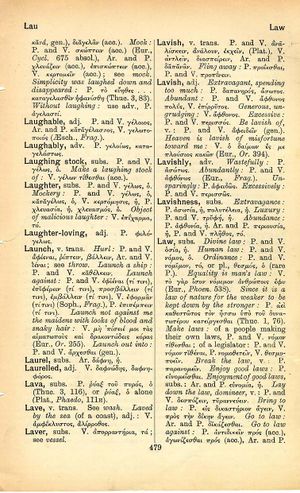law: Difference between revisions
πρὶν τοὺς ἰχθῦς ἑλεῖν σὺ τὴν ἅλμην κυκᾷς → you're mixing the sauce before catching the fish | don't count your chickens before they are hatched | don't count your chickens before they hatch | first catch your hare | first catch your rabbit | first catch your rabbit and then make your stew | first catch your hare, then cook it | first catch your hare, then cook him
(Woodhouse 3) |
(CSV4) |
||
| Line 1: | Line 1: | ||
{{ | {{Woodhouse1 | ||
| | |Text=[[File:woodhouse_479.jpg|thumb|link={{filepath:woodhouse_479.jpg}}]]'''subs.''' | ||
<b class="b2">Divine law</b>: P. and V. [[ὁσία]], ἡ. | |||
<b class="b2">Human law</b>: P. and V. [[νόμος]], ὁ. | |||
<b class="b2">Ordinance</b>: P. and V. νόμιμον, τό, or pl., [[θεσμός]], ὁ (rare P.). | |||
<b class="b2">Equality is man's law</b>: V. τὸ γὰρ ἴσον νόμιμον ἀνθρώποις ἔφυ (Eur., ''Phoen.'' 538). | |||
<b class="b2">Since it is a law of nature for the weaker to be kept down by the stronger</b>: P. ἀεὶ καθεστῶτος τὸν ἥσσω ὑπὸ τοῦ δυνατωτέρου κατείργεσθαι (Thuc. 1, 76). | |||
<b class="b2">Make laws</b>: of a people making their own laws, P. and V. νόμον τίθεσθαι; of a legislator: P. and V. νόμον τιθέναι. P. νομοθετεῖν, V. θεσμοποεῖν. | |||
<b class="b2">Break the law</b>, v.: P. παρανομεῖν. | |||
<b class="b2">Enjoy good laws</b>: P. εὐνομεῖσθαι. | |||
<b class="b2">Enjoyment of good laws</b>, subs.: Ar. and P. [[εὐνομία]], ἡ. | |||
<b class="b2">Lay down the law, domineer</b>, v.; P. and V. δεσπόζειν, τυραννεύειν. | |||
<b class="b2">Bring to law</b>: P. εἰς [[δικαστήριον]] [[ἄγω|ἄγειν]], V. πρὸς τὴν δίκην [[ἄγω|ἄγειν]]. | |||
<b class="b2">Go to law</b>: Ar. and P. δικάζεσθαι. | |||
<b class="b2">Go to law against</b>: P. ἀντιδικεῖν [[πρός]] (acc.), ἀγωνίζεσθαι [[πρός]] (acc.), Ar. and P. δικάζεσθαι (dat.). | |||
<b class="b2">The laws of health</b>: P. τὸ ὑγιεινόν. | |||
<b class="b2">The laws of nature</b>: P. τὰ τῆς φύσεως. | |||
}} | }} | ||
Revision as of 09:45, 21 July 2017
English > Greek (Woodhouse)
subs.
Divine law: P. and V. ὁσία, ἡ. Human law: P. and V. νόμος, ὁ. Ordinance: P. and V. νόμιμον, τό, or pl., θεσμός, ὁ (rare P.). Equality is man's law: V. τὸ γὰρ ἴσον νόμιμον ἀνθρώποις ἔφυ (Eur., Phoen. 538). Since it is a law of nature for the weaker to be kept down by the stronger: P. ἀεὶ καθεστῶτος τὸν ἥσσω ὑπὸ τοῦ δυνατωτέρου κατείργεσθαι (Thuc. 1, 76). Make laws: of a people making their own laws, P. and V. νόμον τίθεσθαι; of a legislator: P. and V. νόμον τιθέναι. P. νομοθετεῖν, V. θεσμοποεῖν. Break the law, v.: P. παρανομεῖν. Enjoy good laws: P. εὐνομεῖσθαι. Enjoyment of good laws, subs.: Ar. and P. εὐνομία, ἡ. Lay down the law, domineer, v.; P. and V. δεσπόζειν, τυραννεύειν. Bring to law: P. εἰς δικαστήριον ἄγειν, V. πρὸς τὴν δίκην ἄγειν. Go to law: Ar. and P. δικάζεσθαι. Go to law against: P. ἀντιδικεῖν πρός (acc.), ἀγωνίζεσθαι πρός (acc.), Ar. and P. δικάζεσθαι (dat.). The laws of health: P. τὸ ὑγιεινόν. The laws of nature: P. τὰ τῆς φύσεως.

